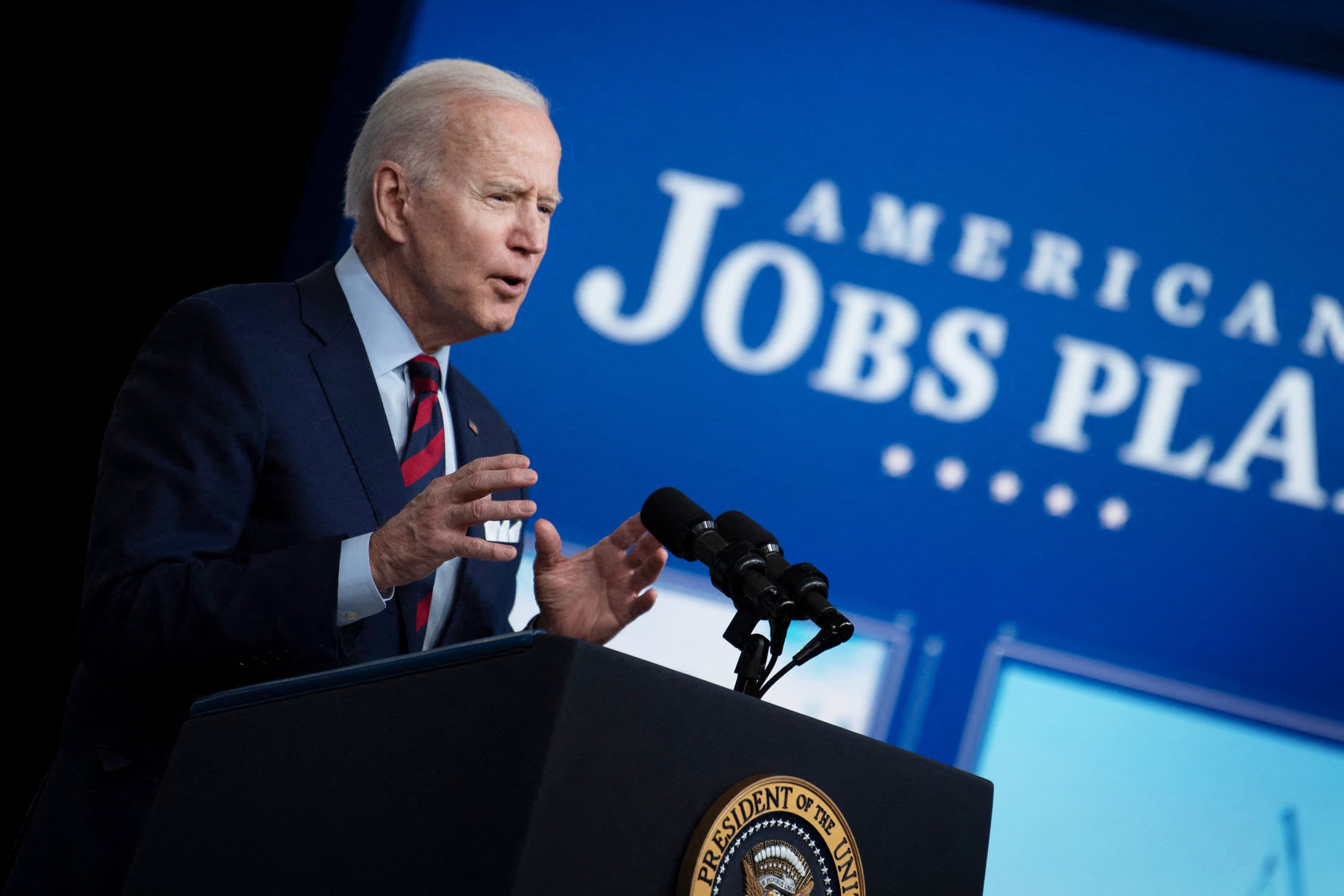
US President Joe Biden speaks about infrastructure investment from the Eisenhower Executive Office Building on the White House campus on April 7, 2021, in Washington, DC.
Brendan Smialowski | AFP | Getty Images
President Joe Biden held his second infrastructure meeting with Democratic and Republican members of Congress on Monday, as GOP lawmakers push to shrink the president’s more than $2 trillion plan.
Biden aims to approve a package in the coming months that revamps U.S. roads, bridges, airports, broadband, housing and utilities, and invests in job training along with care for elderly and disabled Americans. Republicans have signaled they could support a scaled-back bill based around transportation, broadband and water systems.
The president has said he wants to craft a bipartisan bill, but Democrats would move to pass legislation on their own through budget reconciliation if they fail to strike a deal with the GOP. As the parties have disparate visions of what qualifies as infrastructure and how big of a role the government should take in the process, it is unclear what could win support from both Democrats and Republicans.
“I am prepared to compromise, prepared to see what we can do, what we get together on,” Biden told reporters before Monday’s meeting. He said he would talk to lawmakers both about what should go into the plan and how to pay for it.
The group included members of Congress who served as governors or mayors, including Sens. Mitt Romney, R-Utah, and Jeanne Shaheen, D-N.H.
While Biden has said he wants to forge a compromise with the GOP, the sides stand at least $1 trillion apart.
Last week, Sen. Shelley Moore Capito, R-W.Va., told CNBC that she considers a $600 billion to $800 billion infrastructure plan a “sweet spot” that could win support from both parties. She told reporters Thursday that Republicans expect to outline an infrastructure proposal of their own.
Asked Sunday if he would back a roughly $800 billion infrastructure proposal floated by some of his colleagues, Sen. John Cornyn, R-Texas, did not explicitly endorse the figure but signaled he could support a plan with transportation and broadband at its center.
“There is a core infrastructure bill that we could pass with appropriate pay-fors like roads, and bridges, and even reaching out to broadband, which this pandemic has exposed a great digital divide in the country. … I think we could all agree to that, but I think that’s the part we can agree on, so let’s do it,” he said on “Fox News Sunday.”
Appearing on Fox with Cornyn, Sen. Chris Coons, D-Del., floated the possibility of Democrats passing a smaller infrastructure proposal with GOP support and then moving to approve their other priorities on their own.
Efforts to win Republican support could raise a host of problems for Biden. The GOP wants the president to slash proposed spending on electric vehicles and care for elderly and disabled people — two priorities for Democratic lawmakers.
Republicans have also criticized Biden’s plans to offset the infrastructure spending. He has called to hike the corporate tax rate to 28%. The GOP cut it to 21% from 35% in 2017, and has resisted efforts to raise the rate again.
Agreeing on what counts as infrastructure could trip up talks. Sen. Roger Wicker, a Mississippi Republican who met with Biden last week, said Thursday that he wants to see a bill based around the “30% of the president’s proposal that is actually infrastructure.”
It is unclear how much Biden and congressional Democrats would agree to cut from the plan to win GOP support. Wicker, the ranking member of the Senate Commerce Committee, which has broad jurisdiction over transportation and communications issues, said he thinks the infrastructure bill could be bipartisan.
“I’m optimistic, I’m hopeful, I’m looking on the bright side,” he said.
Update: This story was updated to clarify Sen. John Cornyn’s comments on a potential infrastructure bill.




